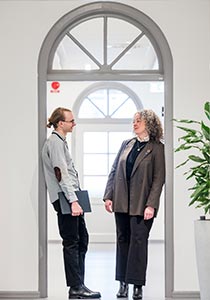Why coordinated support?
The goal of joint and more coordinated operational support is for students, teachers, researchers and other staff to receive equal and accessible support regardless of where they are at KTH.

Up to and including September 2026, KTH must have developed the areas that need to be addressed based on the target image of a joint and coordinated operational support.
Coordinated operational support with high quality and cost-effectiveness frees up time for teachers' and researchers' teaching and research.
The direction of the work
- The schools' operational support forms five new departments, which, together with current departments within GVS, initially make up the new organization. Continued development and organization of support areas is led by the University Director and is a joint effort between the schools and the subject departments within operational support.
- The development work is a multi-year program expected to last until September 2026.
- All personnel join the new organization, initially in their current roles. Employees will be involved and affected in different ways depending on which development is prioritized during the course of the work.
- The work with strategic competence provision within operational support must be developed to ensure the right short and long-term competence.
- The development of operational support must be synchronized with other ongoing developments within KTH. The work on future education and the results from KTH's research evaluation (RAE) are examples of development work within KTH.
- Principles that will pervade and characterize the development work within operational support are an operational benefit, closeness to operations, involvement and participation, and work culture for renewal and mutual respect.
Principles
The development of operational support must be characterized by five principles, which are the central values during the process.
- Operational benefit: All support aims to create benefits for the recipient. On an overall level, this means that the support should contribute to optimizing teachers' and researchers' time for teaching and research and the opportunity for students and support staff to carry out their tasks with high quality and cost-effectiveness. In parallel, the operational support must also contribute to KTH living up to its role as an authority.
- Close to operations: The support must be experienced as close to operations as it is designed uniformly within KTH. Sometimes the support is best organized close to the department or school level, and sometimes it is more appropriate for the support to be organized remotely and serve the whole of KTH with a specific competence or system support.
- Involvement and participation:An operational support that provides benefits and is perceived as close to the core organization requires involvement and participation. Therefore, needs must be captured through the involvement of representatives of teachers and researchers and various constellations within the operational support.
- Work culture for renewal: The development of the operational support must take place in close dialogue and cooperation with the users of the support, i.e. teachers, researchers, students and staff within the operational support. The work must be characterized by working together with an iterative, testing and learning approach.
- Mutual respect: The design of support that provides high-quality and cost-effective operational benefits requires mutual respect for all the functions required to conduct education and research at a higher education institution.
